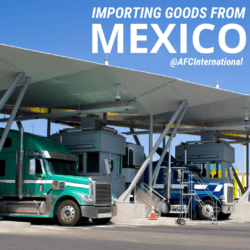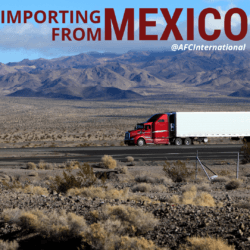
According to Forbes magazine, in 2019, Mexico has become the leading U.S. trade partner. This information makes it imperative for all importers to know the rules and regulations for importing goods from Mexico.
With over $611.5 billion in total trade during 2019, Mexico was the United States’ second-largest supplier of goods imports in 2018.
Importing Goods from Mexico -Top imports to the United States:
- Vehicles ($93 billion)
- Electrical machinery ($64 billion)
- Machinery ($63 billion)
- Mineral fuels ($16 billion)
- Optical and medical instruments ($15 billion)
Mexico is the United States’ largest supplier of agricultural products totaling $26 billion dollars. Mexico’s top agricultural imports are:
- Fresh vegetables ($5.9 billion)
- Fresh fruit ($5.8 billion)
- Wine and beer ($3.6 billion)
- Snack foods ($2.2 billion)
- Processed fruit & vegetables ($1.7 billion)
Guide to Importing from Mexico

Gather Your Documents
Use this checklist to make sure you have all the documents submitted to Customs and Border Protection (CBP):
- A commercial invoice containing information about your shipment
- A Packing List including shipment weight
- A NAFTA Certificate of Origin (if applicable)
- Speak with your customs broker to ensure you understand the Mexican customs agents’ export handling costs.

Mark Your Goods Properly
Your goods have to be marked with their country of origin to achieve import clearance. Marking regulations will apply to your import based on the nature of the goods and the transaction. AFC International has customs experts that can help you navigate tariffs and requirements for your import.
Know Which Goods are Duty-Free
The North American Free Trade Agreement of NAFTA could make goods that are made in Canada or Mexico duty-free. To take advantage of NAFTA, you will need to show the qualification of your goods with a NAFTA Certificate of Origin.
Connect With a Customs Broker
Our licensed Customs Brokers have resources to ensure that importing is done efficiently and that your imports are filed correctly and that rules and regulations are followed. Working with a licensed Customs Broker that utilizes the best resources for importing ensures that your imports are filed properly and import clearance delays are avoided altogether.


Leave a Reply
You must be logged in to post a comment.